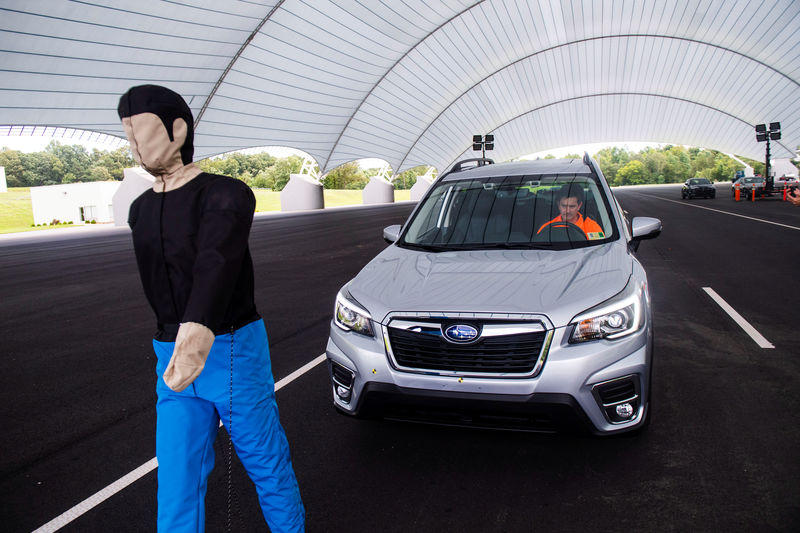By Tina Bellon
(Reuters) - The performance of modern pedestrian detection systems varies widely between carmakers, with high-end luxury brands generally faring better and other models failing to recognize pedestrians altogether, according to a study released on Tuesday by a U.S. insurance research group.
The assessment comes at a time when pedestrian deaths on U.S. roads are spiking, with an estimated 6,283 people on foot killed by vehicles in 2018, a year that saw the highest number of cyclist and pedestrian deaths since 1990.
Automakers are beefing up crash avoidance technology on new cars, increasingly making the systems part of their standard equipment in 2020 models.
Pedestrian detection systems, enabled by windshield-mounted cameras or radar sensors in a vehicle's front grill, are coupled with a car's automatic emergency braking system and intended to stop the vehicle if it detects a pedestrian in its path.
The study by the U.S. Insurance Institute for Highway Safety (IIHS) found that not all systems perform equally well. Of the 19 latest-year editions and models IIHS tested, 13 avoided pedestrians entirely, or at least managed to reduce speeds significantly.
While the best-performing cars included luxury models Audi (DE:VOWG_p) A4, BMW 3 series and a version of the Mercedes-Benz C-class, IIHS also gave its best rating to the Nissan Maxima and Volvo S60.
The Chevrolet Malibu, a Ford Fusion, Hyundai Sonata and Kia Optima, were among tested cars that did not reduce speeds in some tests or failed entirely.
The IIHS testing scenarios included an adult crossing the road, a child darting out from behind an obstacle and an adult walking near the edge of the road - situations that account for more than half of all pedestrian deaths.
All tests were conducted during the day and on dry roads, as those are the only scenarios for which automakers currently commit their technology, said IIHS President David Harkey.
"This technology is in its infancy," Harkey said in a phone interview. "But let's acknowledge what the automakers are doing well and encourage them to do more."
Tests by the American Automobile Association (AAA) earlier this month showed more devastating results when the technology is tested at night, a time when 75% of pedestrian fatalities occur.
None of the 2019 test cars - a Chevrolet Malibu, Honda Accord, Tesla (NASDAQ:TSLA) Model 3 and Toyota Camry - was able to detect an adult pedestrian in the dark.

IIHS's Harkey called on automakers to also develop better headlights to allow systems to spot pedestrians at night.